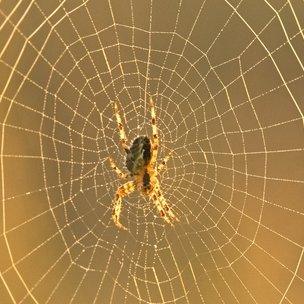GM silk worms make Spider-Man web closer to reality
- Published

Spider-Man's webbing is something that researchers have been trying to reproduce for decades
US researchers have created silkworms that are genetically modified to spin much stronger silk.
Writing in the PNAS journal, scientists from the University of Wyoming say that their eventual aim is to produce silk from worms that has the toughness of spider silk.
In weight-for-weight terms, spider silk is stronger than steel.
Comic book hero Spider-Man generated spider silk to snare bad guys and swing among the city's skyscrapers.
Researchers have been trying to reproduce such silk for decades.
But it is unfeasible to "farm" spiders for the commercial production of their silk because the arachnids don't produce enough of it - coupled with their proclivity for eating each other.
Silk worms, however, are easy to farm and produce vast amounts of silk - but the material is fragile.
Researchers have tried for years to get the best of both worlds - super-strong silk in industrial quantities - by transplanting genes from spiders into worms. But the resulting genetically modified worms have not produced enough spider silk until now.
GM worms produced by a team led by Professor Don Jarvis of Wyoming University seem to be producing a composite of worm and spider silk in large amounts - which the researchers say is just as tough as spider silk.
Commenting on the work, Dr Christopher Holland from the University of Oxford, said that the development represented a step toward being able to produce toughened silk commercially.
"Essentially, what this paper has shown is that they are able to take a component of spider silk and make a silkworm spin it into a fibre alongside its own silk," he said.

The best of both worlds - scientists want to produce super strong silk in industrial quantities
They have also managed to show that this composite, which contains bits of spider silk and mainly the silkworms' own silk, has improved mechanical properties."
The main applications could be in the the medical sector creating stronger sutures, implants and ligaments. But the GM spider silk could also be used as a greener substitute for toughened plastics, which require a lot of energy to produce.
There are concerns, though, about creating GM worms for industrial applications in case they escape into the wild. But according to Professor Guy Poppy of Southampton University, they would not pose an environmental threat and he believes the benefits would outweigh any risk.
"It's hard to see how a silkworm producing spider silk would have any advantage in nature," he said.
Follow Pallab on Twitter, external
Related topics
- Published20 April 2011
- Published17 June 2011